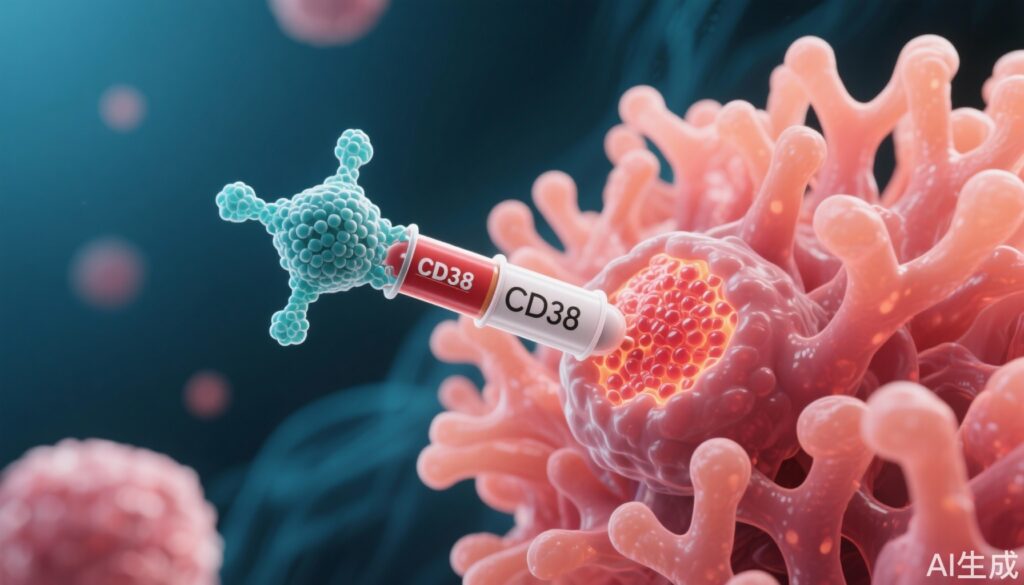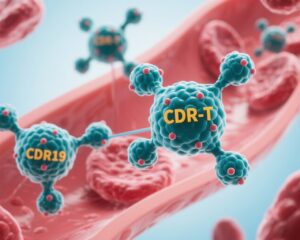Study Background and Disease Burden
Multiple myeloma (MM) is a hematologic malignancy characterized by clonal proliferation of plasma cells in the bone marrow, leading to bone destruction, anemia, renal dysfunction, and immunodeficiency. Despite recent therapeutic advances including proteasome inhibitors, immunomodulatory agents, monoclonal antibodies targeting CD38 or B-cell maturation antigen (BCMA), and CAR-T cell therapies, relapsed/refractory multiple myeloma (RRMM) remains incurable with limited treatment options for heavily pretreated patients. The emergence of triple-class refractory disease—defined as resistance to proteasome inhibitors, immunomodulatory drugs, and anti-CD38 monoclonal antibodies—poses a significant clinical challenge. Novel therapeutic agents with unique mechanisms of action targeting resistant myeloma cells are urgently needed to extend progression-free survival (PFS) and improve response rates in this difficult-to-treat population.
Modakafusp alfa is a first-in-class immunocytokine that directs interferon alfa to CD38-expressing cells, combining targeted immunomodulation with direct antitumor effects. By selectively delivering interferon alfa to the myeloma cells, modakafusp alfa aims to enhance antimyeloma immune responses while minimizing systemic interferon-associated toxicity. Early phase 1/2 data showed promising overall response rates (ORR) with two potential therapeutic doses identified. This phase 2 dose optimization study (NCT03215030) further evaluates efficacy and safety in a large cohort of heavily pretreated, triple-class refractory patients, many of whom had prior exposure to BCMA-directed therapies.
Study Design
This randomized, open-label, phase 2 study enrolled 147 patients with RRMM who were refractory to at least three prior lines of therapy, including proteasome inhibitors, immunomodulatory agents, and anti-CD38 monoclonal antibodies. Patients had a median of six prior therapies; notably, 66% were penta-exposed, and 45% had received prior anti-BCMA treatments. The study randomized patients 1:1 to receive fixed doses of modakafusp alfa: 120 mg (equivalent to 1.5 mg/kg) or 240 mg (equivalent to 3 mg/kg), administered intravenously every four weeks. The primary objective was to optimize dosing based on efficacy measured by ORR and safety profile. Secondary endpoints included progression-free survival, duration of response, and incidence of treatment-emergent adverse events (TEAEs). The study was terminated early due to strategic sponsor decisions, with median follow-up of approximately 7.3 to 7.6 months per arm.
Key Findings
At analysis, the ORR was 32% in the 120 mg arm and 41% in the 240 mg arm, demonstrating dose-dependent activity. Median progression-free survival was 4.1 months with 120 mg and 5.3 months with 240 mg, indicating a trend towards improved disease control with the higher dose. Importantly, patients without prior BCMA therapy exhibited higher ORR (46%) compared to those previously exposed to anti-BCMA agents (29%), underscoring potential cross-resistance or impact of prior BCMA-directed therapy on modakafusp alfa efficacy.
The safety profile was consistent with the known effects of interferon and myelosuppressive agents. The most common treatment-related adverse events were thrombocytopenia (75% in the 120 mg arm, 84% in the 240 mg arm; grade ≥3, 55% and 61%, respectively) and neutropenia (68% and 73%; grade ≥3, 56% and 68%, respectively). High-grade adverse events were frequent, with 90% and 96% of patients experiencing grade ≥3 TEAEs and 39% and 44% suffering serious TEAEs in the 120 mg and 240 mg groups, respectively. Despite this, the toxicity was manageable with supportive care and dose modifications.
The early termination of the study limited the extent of long-term follow-up and survival outcome assessment. Nevertheless, these data confirm modakafusp alfa’s single-agent activity in this heavily pretreated, refractory population, offering new treatment possibilities for patients with RRMM, particularly those without prior BCMA therapies.
Expert Commentary
Modakafusp alfa represents an innovative immunocytokine approach targeting CD38+ myeloma cells, distinct from current monoclonal antibodies by incorporating interferon alfa to potentiate antitumor immune responses. The dose-related efficacy trends support further investigation of the higher 240 mg dose despite increased hematologic toxicity. The differential response based on prior BCMA exposure highlights the evolving therapeutic landscape and the need to tailor treatment sequences carefully in RRMM.
Limitations include the early study termination restricting durability and overall survival data, and the high incidence of grade ≥3 hematologic toxicities necessitating vigilant monitoring. Future trials might explore combination regimens or alternative dosing schedules to optimize the balance between efficacy and safety. In addition, biological studies could elucidate mechanisms underlying reduced efficacy in BCMA-exposed patients and resistance patterns.
Conclusion
This phase 2 randomized study establishes modakafusp alfa as an efficacious and tolerable single-agent therapeutic option for patients with relapsed/refractory multiple myeloma, especially those with triple-class refractory disease and no prior exposure to anti-BCMA therapies. The findings advocate for continued clinical development of modakafusp alfa, potentially in combination with other novel agents, to extend treatment options for this challenging patient population. Further research is warranted to refine patient selection, mitigate toxicity, and improve long-term outcomes.
References
Holstein SA, Atrash S, Mian H, Dimopoulos MA, Schjesvold F, Popat R, et al. A phase 2 randomized study of modakafusp alfa as a single agent for patients with relapsed/refractory multiple myeloma. Blood. 2025 Aug 28;146(9):1051-1064. doi: 10.1182/blood.2024027873. PMID: 40279508.


